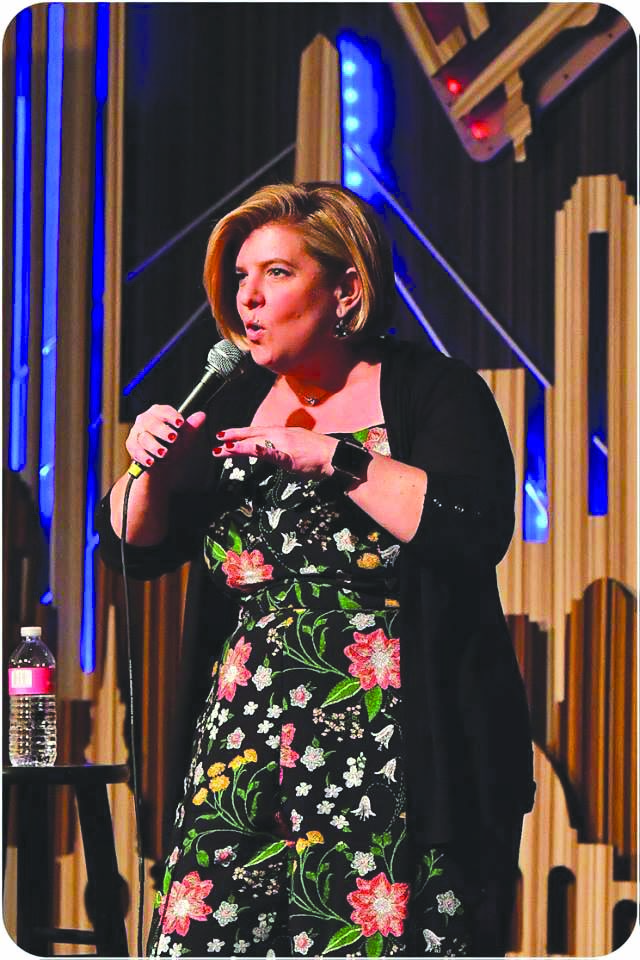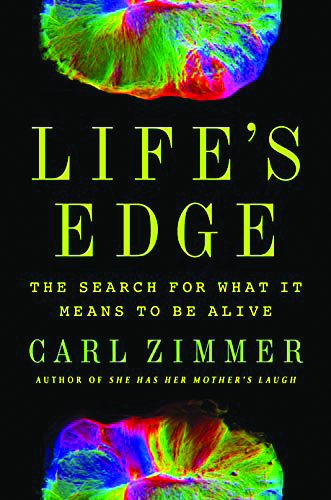Life’s Edge: the Search for What It Means to Be Alive, by Carl Zimmer (Dutton, 336 pages)
In his 14th book, New York Times science columnist Carl Zimmer had me at abortion.
It was something he had to address, of course, in a book called Life’s Edge, which explores the surprisingly difficult question of whether things are alive, dead or something else. In fact, for many people, the only time they will think about the question is when they are considering the legality of abortion, or are asked by a Senate panel “When does life begin?”
Abortion so rules this debate in America that it’s easy to think that it began with Roe v. Wade. But, as Zimmer explains in the elegantly titled chapter “The Way the Spirit Comes to the Bones” — a variation of a line from Ecclesiastes — people of faith have been grappling with the ethics of abortion for millenia, and some deeply religious people have had views you might not expect.
Thomas Aquinas, for example, said that human beings acquired souls in a process that he called “ensoulment,” and that in the first phase the embryo was basically vegetative, “with the same faculties for growth as plants.” In one culture in South Africa, people believed that babies weren’t fully human until their umbilical cord stump detached, which can take up to three weeks after a baby is born. Some early Jewish scholars taught that embryos were “mere water” before the 40th day after conception. And in England in 1765, a judge ruled life does not begin until what is known as “quickening” — the first fetal kick. And so forth. There has never been consensus that life begins at conception, as today’s abortion opponents fervently believe.
Zimmer doesn’t wade into this subject to alienate his readers, but to engage them through the most contemporary (and understandable) example of the ethical morass that increasingly confronts scientists as they work with gene-editing tools and three-dimensional clumps of cells that weren’t in their laboratories two decades ago.
Science has answered many complex questions with certainty, but what distinguishes life, and how it arose from nothing, remains a mystery. There have been times when we appeared to be on the brink of a breakthrough. Zimmer tells the story of the Englishman John Butler Burke, who, for a time in the early 20th century, was hailed as a hero for apparently growing life from a fluid made of beef both, salt, gelatin and radium salt. The microscopic spheres that emerged seemed to divide and to flower, like cells.
Burke announced that his “radiobes” should be classified as living things, and for a while his work was celebrated, his accomplishment comparable to Darwin’s. Other scientists, however, could not replicate Burke’s work, and eventually he fell into disrepute.
Zimmer was intrigued when he came across the little-known story, because, as he puts it, we tend to remember the heroes of science, the Darwins and the Pasteurs, not the also-rans. But the failures, to include the British scientists who once believed the ocean floor was alive, are fascinating in their own right and help to explain the head-banging frustration over why something that seems so simple is so difficult to define. Even chimpanzees know when another of their species is dead; why are human beings, who can now grow brain tissue in dishes, unable to find the precise recipe for life?
About that tissue — Zimmer does a superb job of explaining organoids, the three-dimensional clumps grown from stem cells, that are the new frontier in research on disease. (And in ethics, especially when it comes to brain organoids, and at what point does potential consciousness become a concern.) Just this month researchers reported in a medical journal that they had induced organoids made of tear-gland cells to “cry,” a finding that they hope may result in better treatments for dry eyes. On a cringe scale, weeping cells in petri dishes are just below conscious brains in buckets, so organoids are something we all should better understand.
So what is life? NASA has an 11-word definition, which is “life is a self-sustaining chemical system capable of Darwinian evolution.” Not something you would want to put on a “congratulations on your new baby” card. But another definition, “self-reproduction with variations,” could also describe a computer virus.
So not only can we not create life in a lab, but we can’t even elegantly define it. Zimmer comes as close to poetry as the science-minded get, however, and Life’s Edge is an accessible, engrossing examination of questions that have stumped the smartest people on the planet for thousands of years. A
BOOK NOTES
Fans of the novelist Ann Patchett will be interested in her recent essay in Harper’s magazine. Called “These Precious Days,” the essay is about “Tom Hanks, tornadoes, running bookstores, taking mushrooms, making art in quarantine, stories without endings and an unlikely friendship,” according to the magazine cover.
It’s slated to become a book, set for release the week of Thanksgiving. The 320-page book, also called These Precious Days, will be published by Harper, proving that despite all the talk about how slow the publishing process is, even the legacy publishers can move fast when they sense opportunity.
This was also demonstrated in the speed with which books on the pandemic arrived last year. Writer’s Digest says it can take from nine months to two years for a book to go from contract to shelves, but books about the novel coronavirus were showing up on Amazon within months of the first lockdowns.
With the first anniversary of the pandemic observed this month, here’s a look at what’s out there to consider:
Apollo’s Arrow by Nicholas Christakis (Little, Brown, 384 pages) examines “the profound and enduring impact of the coronavirus on the way we live.” It’s hardcover and Kindle only for now, but will be out in paperback in October.
COVID-19: The Pandemic that Never Should Have Happened and How to Stop the Next Oneis by science journalist Debora MacKenzie (Hachette, 304 pages). Interestingly, it’s been rebranded for the paperback release in September and will be released then as Stopping the Next Pandemic: How COVID-19 Can Help Us Save Humanity.
Richard Horton, the British editor of the renowned medical journal The Lancet, weighed in with The COVID-19 Catastrophe (Polity, 140 pages), which is already out in paperback with no title change.
Out this month is Dr. Peter Hotez’s Preventing the Next Pandemic: Vaccine Diplomacy in a Time of Anti-Science (Johns Hopkins University Press, 208 pages).
And for a totally different vibe, check out Kitty O’Meara’s children’s book And the People Stayed Home (Tra Publishing, 32 pages), a beautifully illustrated rendition of O’Meara’s prose poem that went viral on social media last year
Books
Author events
PAULA MUNIER Author presents The Hiding Place. Hosted by Gibson’s Bookstore in Concord. Virtual, via Zoom. Tues., March 30, 7 p.m. Registration required. Visit gibsonsbookstore.com or call 224-0562.
• THERESA CAPUTO the star of TLC’s Long Island Medium will present “Theresa Caputo: The Experience Live” at the Capitol Center for the Arts (44 S. Main St. Concord, ccanh.com) on Wed., April 7, 7:30 p.m. Tickets start at $39.75 (with option for a VIP Photo Op for an additional $49.95).
• MICHAEL TOUGIAS Author of The Waters Between Us presents. Virtual, via Zoom. Part of Concord’s Walker Lecture Series. Wed., April 7, 7:30 p.m. Free. Call 333-0035 or visit walkerlecture.org.
• SCOTT WEIDENSAUL Author presents A World on the Wing. Tues., April 20, 7 p.m. The Music Hall, Historic Theater, 28 Chestnut St., Portsmouth. Tickets cost $46. Visit themusichall.org or call 436-2400.
• ERIN BOWMAN Author presents Dustborn. Hosted by Gibson’s Bookstore in Concord. Virtual, via Zoom. Tues., April 20, 7 p.m. Registration required. Visit gibsonsbookstore.com or call 224-0562.
• SUZANNE KOVEN Author presents Letter to a Young Female Physician, in conversation with author Andrew Solomon. Tues., May 18, 7 p.m. Virtual. Tickets cost $5. Visit themusichall.org or call 436-2400.
Book Clubs
• BOOKERY Online. Monthly. Third Thursday, 6 p.m. Bookstore based in Manchester. Visit bookerymht.com/online-book-club or call 836-6600.
• GIBSON’S BOOKSTORE Online, via Zoom. Monthly. First Monday, 5:30 p.m. Bookstore based in Concord. Visit gibsonsbookstore.com/gibsons-book-club-2020-2021 or call 224-0562.
• TO SHARE BREWING CO. 720 Union St., Manchester. Monthly. Second Thursday, 6 p.m. RSVP required. Visit tosharebrewing.com or call 836-6947.
• GOFFSTOWN PUBLIC LIBRARY 2 High St., Goffstown. Monthly. Third Wednesday, 1:30 p.m. Call 497-2102, email elizabethw@goffstownlibrary.com or visit goffstownlibrary.com
Featured photo: Life’s Edge: the Search for What It Means to Be Alive






